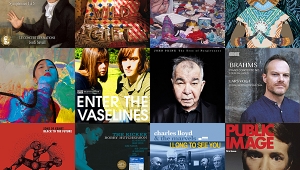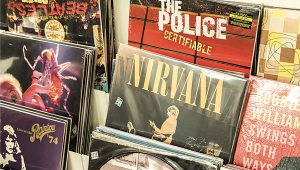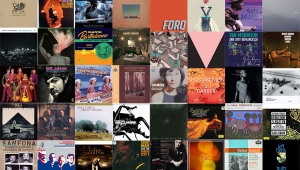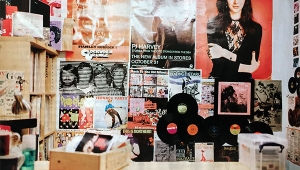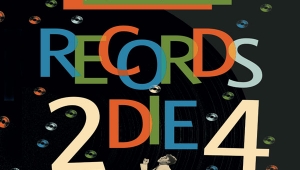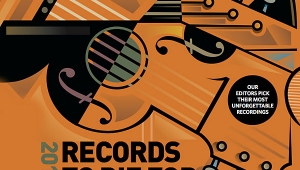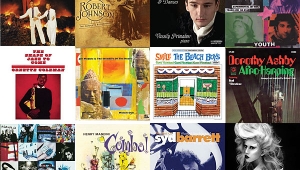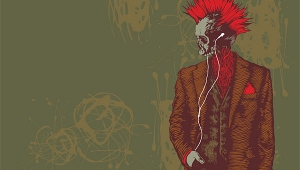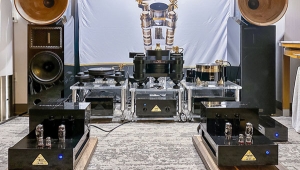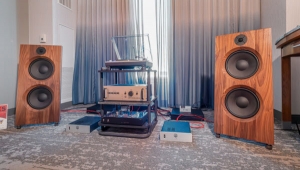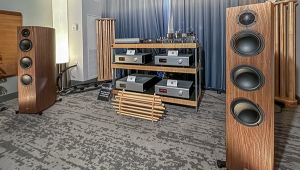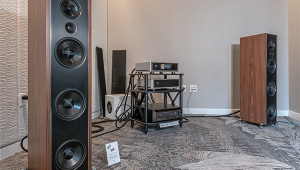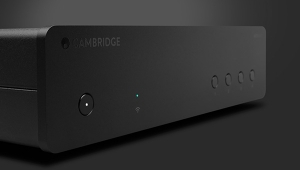| Columns Retired Columns & Blogs |
2003 Records To Die For Page 4
Jon Iverson
BUZZCOCKS: A Different Kind of Tension
Nettwerk 30247 (CD). 1979/2001. Martin Rushant, prod., eng.; Martin Hannett, prod. AAD. TT: 40:18
There was a time when bands could create concise punk-pop tunes that poked at society's excesses without sounding as though the music had been contrived to reach a target market of "rebel youth." This disc is from that era (1979) and perhaps sounds a bit bright, but what a great batch of catchy, well-crafted songs full of caustic wit. For example, the title track takes aim at the mixed messages we're bombarded with in the media, coupling them so as to render each neutral: "Be ambitious / be modest, plan ahead / be spontaneous, decide for yourself / listen to others, save money / spend money," etc. The Buzzcocks were a classic rock-punk quartet—two guitars, bass, and drums—their strength the result of tightly arranged bursts of music without indulgent solos or gratuitous ornamentation. Originally issued on CD in 1989; the 2001 remaster is the one to have.
STEVE TIBBETTS: A Man About a Horse
Steve Tibbetts, guitar, percussion; Jim Anton, bass; Marc Anderson, Marcus Wise, percussion
ECM 1814 (CD). 2002. Steve Tibbetts, prod., eng. ADD. TT: 45:07
If there was a perfect album released in 2002, then to my ears, this is it. Guitarist-percussionist Steve Tibbetts works in that suspended space between music and noise, rendering sonic mindscapes both accessible and challenging. Supported by master percussionist Marc Anderson, Tibbetts' music is the perfect antidote to bland and safe audiophile fare. If you've never heard him before, here's a great place to start, and there are a half dozen more recordings from him that are just as good. The disc was brilliantly mastered by Morten Lund at Masterhuset in Norway, and will fill your room with ribbons of rhythmic sound. My only question: Why isn't this guy at the top of everyone's list? (XXVI-1)
J.S. BACH: Goldberg Variations
Glenn Gould, piano
Sony Classical 87703 (3 CDs). 1955/1981/2002. Howard H. Scott, prod.; Frank H. Decker, Jr., eng. AAD/ADD/DDD. TT: 2:33:10
Glenn Gould's stunning 1955 debut recording, of Bach's Goldberg Variations, clocked in at a nice, crisp 45 minutes. That this latest, 70th-birthday anniversary release has expanded to 2½ hours shows the extent to which Gould's artistry looms large in our imaginations. The reason for the additional time is that Sony's new edition also includes the more affecting, if somewhat more affected, 1981 traversal, as well as a third disc of outtakes and interviews. The engineers have also returned to an analog master of the 1981 performance that was made at the same time as the original all-digital release. Count Kaiserling, who, according to legend, commissioned the work to soothe his insomnia with nocturnal performances by his harpsichordist, Johann Gottlieb Goldberg, would surely have loved all of this Gouldiana—assuming, of course, that Kaiserling's objective was not to fall asleep, but rather to stay awake and listen to electrifying music. Gould's performances are riveting from beginning to end, whether in his 1955 watershed recording or in the occasionally more introspective 1981 victory lap. (XXV-11)
GRIEG: Lyric Pieces
Emil Gilels, piano
Deutsche Grammophon 449 721-2 (CD). 1974/1996. Günther Breest, prod.; Klaus Scheibe, Wolf-Dieter Karwatky, engs. ADD. TT: 56:21
Like Glenn Gould, Emil Gilels took a hands-on approach to the recording process and the technology that would represent him for posterity. Gilels spent six days in 1974 recording this album of Edvard Grieg's Lyric Pieces, most of that time devoted to getting just the right sonority on tape. The effort shows: the atmosphere of this record, at once intimate and exotic, perfectly distills the flavor of Norwegian peasant life and folk music. While many piano students could easily handle the modest technical demands of these delicate works, the Lyric Pieces truly spring to life only in the hands of a great artist willing to try to capture all the subtle shadings and nuance in these miniature forms. A super-virtuoso like Gilels might seem an unlikely match for this repertoire, but, like Horowitz playing Scarlatti, it is an odd coupling so perfect that it's hard to imagine these pieces ever being more sympathetically rendered.
LITTLE FEAT: Waiting for Columbus
Warner Bros./Rhino/Hot Tomato R2 78724 (2 CDs). 1978/2002. Lowell George, orig. prod.; Warren Dewey, orig. eng.; Gary Peterson, Bill Payne, Paul Barrère, reissue prods. AAD. TT: 2:18:11
Check out the December 2002 issue for a full review of this, but it can't be said often or loudly enough: Little Feat's Waiting for Columbus might just be the best live rock album ever released. No American band ever played with time so loosely or tightly, or sounded as if they were having more fun, than the Feat at their best, and their best, with founder Lowell George at the helm, is what was captured here in 1977. Now the album is even better: on two well-packed CDs instead of one, now incorporating previously unreleased tracks and others that wound up on other Feat discs. The sound was always so vivid you'd swear you could see your speaker grilles bulge as the Feat struggled to bust loose. Now it, too, is even better: fuller bass, sweeter highs, and a mix that reveals even more of these thick rhythmic textures and dense instrumental interplay. This music will make you happy. (XXV-12)
TOMASZ STANKO QUARTET: Soul of Things
Tomasz Stanko, trumpet; Marcin Wasilewski, piano; Slawomir Kurkiewicz, bass; Michal Miskiewicz, drums
ECM 1788 (CD). 2002. Manfred Eicher, prod.; Jan Erik Kongshaug, eng. DDD. TT: 74:55
"I've been playing the same song my whole life," says 60-year-old jazz trumpeter Tomasz Stanko. It's a song of deep feeling and graceful power. Supported by a young rhythm section from his native Poland that plays with the clarity and grace of the original Bobo Stenson Quartet, on the 13 meditations (numbered I-XIII) of Soul of Things Stanko evokes the spirits of the finest trumpeters, dead and living, while creating of a mood and a voice uniquely his own. Yes, you can hear the influences of Miles Davis, Kenny Wheeler, and Chet Baker at their most introspective and profound, as well as hotter, more rasping traces of Lee Morgan and Clifford Brown. Imagine that Miles never went electric but just kept getting more achingly interior in the acoustic vein, and that we never had to make do with Wynton Marsalis. This disc stands shoulder to hiply slumped shoulder with Kind of Blue, and has even better sound—ECM's deep and finely burnished finest. A sleeper and a keeper. (XXV-7)
APHEX TWIN: Selected Ambient Works V.2
Sire 45482-2 (2 CDs). 1994. Richard D. James, eng., prod. ADD? TT: 2:32:03
At once disturbing and soothing, so passive it's aggressive, both barren and fertile, the work of Richard D. James (aka Aphex Twin) on these two CDs takes techno-electronica away from the dancing dopes and slows it down to almost Morton Feldmanian levels. The soundscape is haunting and hypnotic; it reminds you of everyone and everything else, but you can label none of it. All the components are unreliable—the rhythms, the patterns, the types of sounds—and yet it coheres. It's thinking man's ambient music, new-age stuff for the dissatisfied, and definitely not for children. Whatever it is, it defines its own art; as sheer sound, it's breathtaking.
DONIZETTI: Lucia di Lammermoor
Maria Callas, soprano; Giuseppe di Stefano, tenor; Rolando Panerai, baritone; Nicola Zaccaria, bass; others; Coro del Teatro alla Scala di Milano, RIAS Sinfonie-Orchester Berlin, Herbert von Karajan
EMI 66441 2 (2 mono CDs). 1955/1997. Allan Ramsay, remastering. ADD. TT: 119:17
EMI has done everything it can to clean up the "pirate" sound of this 1955 live performance, but those who still can't get past the sonics will miss out on what is, arguably, THE Lucia of the last century. Everything was in place—Karajan and Callas together had a fire that burns brilliantly, she is in amazingly secure and, yes, beautiful, voice, di Stefano's passion is under control and the voice at its peak, and the rest of the cast, down to the choristers, know that they're taking part in something special. The Sextet is so thrilling it has to be repeated, and the Mad Scene is sad, inward, and spectacularly acrobatic. Overcome the sound—just this once—and treasure this performance.
PETERIS VASKS: String Quartets 2 & 3
Riga String Quartet
Caprice 21635 (CD). 1999. Kjell Söderqvist, prod.; Karlis Pinnis, eng. DDD. TT: 50:37
One of David Hancock's many memorable witticisms was his assertion that "They call it 'contemporary' music because it is mostly a con, and all temporary." Peteris Vasks' String Quartet 2, Songs of the Summer, may constitute, in and of itself, an adequate refutation of Hancock's Dictum. Beyond that, you should audition this recording just to hear how absolutely wonderful a first-class string quartet, playing in a space with fabulous natural acoustics, can sound. (The space in this case is an exquisite 1727-vintage Protestant—but Baroque—church in Riga, Latvia.) But I'd like to think that, even in a quotidian studio recording, the freshness and sincerity of Vasks' musical inspiration, and the selfless organicity of his compositional technique, would shine through. Vasks' postmodern but entirely undespairing melding of musical Impressionism with the sounds of nature makes him a worthy successor of Ravel, Debussy, and Messiaen. Be not afraid!
ENCARNACIÓN VÁZQUEZ: Cuando Dos
Encarnación Vázquez, mezzo-soprano; Jaime Márquez, guitar
Urtext JBCC 013 (CD). 1997. Juan Echevarría, prod.; Humberto Terán, eng. DDD. TT: 51:29
No scare-off factor here. Encarnación Vázquez' voice is bittersweet chocolate with a Cointreau chaser. Just enjoy it. This collection of Spanish and Mexican songs for female voice and guitar is entitled after the last track, the first recording of Jesús Echevarría's haunting contemporary art song "Cuando Dos." Entirely worthy of Fauré, this petite masterpiece supports a neo-Classical tendril of melody with delicately pastel harmonic shadings. Once you hear it, it will stick with you. The rest of the program calls on such luminaries as Falla, Revueltas, and Guastavino, and the singing and playing rise to the occasions. Urtext's favorite recording rig at the time was a Nagra-D and a stereo pair of Schoeps mikes, and who am I to gainsay that? Excellent liner notes and first-class packaging. Not to be missed.
THE FUCKING CHAMPS: IV
Drag City DC 197 (CD). 2000. Tim Green, Tim Soete, Josh Smith, prods., engs. AAD. TT: 38:52
No words here. Just amazing music. IV is the kind of album that will have you wondering how in the world such brilliance could ever be possible.
MODEST MOUSE: The Moon & Antarctica
Epic EK 63871 (CD). 2000. Brian Deck, prod., eng. ADD. TT: 59:53
Listening to Modest Mouse's earlier recordings, it's not difficult to trace their songwriting progression. Gradually, the albums become more focused and complete, sonically more pristine and adventurous. This, their major-label debut, produced and mixed by Brian Deck of the Red Red Meat, is a wry, playful, haunting concept album that documents a desperate man's constant, perhaps futile struggle to find the point where the circle begins. Modest Mouse's website says that the songs were sent to them in "envelopes that had neither postmarks nor return addresses" from a fan and follower who, apparently, had lost touch with reality. Though the words and music within these rantings were "practically illegible," the soul is captured and conveyed by the band.
ALISON KRAUSS & UNION STATION: New Favorite
Rounder RRCD 0495 (CD), Diverse DIV001LP (LP). 2001. Alison Krauss, Union Station, prods.; Gary Paczosa, eng., mix. DDD? TT: 45:09
Some of the best of today's new music is coming out of Nashville, Tennessee—Alison Krauss had to fight off stiff challenges from both Lambchop and Nickel Creek for inclusion in my 2002 R2D4 selection. One of New Favorite's claims to fame is that part of it is used on the soundtrack of the Coen Bros.' film O Brother, Where Art Thou?, that entertaining country variation on Homer's Odyssey. That might assist familiarity but is otherwise irrelevant. What matters is that Krauss is not only an excellent singer quite able to get the hairs on the back of your neck going, she also fully understands the importance of excellent recording quality. Her band, Union Station, is right on the money too. It all adds up to an intense and rewarding musical experience, regardless of genre.
SHOSTAKOVICH: Symphony 11, "The Year 1905"
Mstislav Rostropovich, London Symphony Orchestra
LSO Live LSO 0030 (CD; SACD planned). 2002. James Mallinson, prod.; Tony Faulkner, eng. DDD. TT: 72:24
I've always struggled to enjoy recorded orchestral music, whose complexity of dynamic range and texture give all the various media a hard time: background noise in the case of analog vinyl or radio, "digititis" on CD. However, engineer Tony Faulkner has been leaving out the digital filtering when recording in DSD the latest releases for the London Symphony Orchestra's own budget label, LSO Live. That may be why they sound so good. He's also planning to release on SACD, once problems of pressing capacity are resolved.
SPIRIT: 12 Dreams of Dr. Sardonicus
Epic/Legacy EK 65003 (CD). 1970/. David Briggs, prod. AAD? TT: 54:13
The first six "dreams" of Spirit's mainmen, Randy California and Jay Ferguson, are pop constructions as tight and clever as any sequence of songs you'll find on just about any rock album of the 1970s. Dreams opens with a 42-second quixotic acoustic ditty, "Prelude," shattered by the buoyant anthem "Nothing to Hide." When I discovered this album around 1974, I was 17 and easily confused; it sounded as if they were singing "We got nothin' to hide / We're married to the same guy." "Rock on," I thought. "Be upfront about your bad selves." (The line is actually "We're married to the same bride." Duh. This is your brain on drugs...) Dreams is taut with lyrical and melodic hooks: "Morning Will Come" is a pop rocket of thrumming guitars, percussion, horns, and harmonies; "Nature's Way" is a dark acoustic elegy for the ecology; and a nah-nah-nah chorus, galloping calliope, and lots of layered acoustic'n'electric guitars propel "Mr. Skin." (Shame on Tom Scholz of Boston for so shamelessly stealing much of Spirit's sound for his dreary arena rock a few years later.)
ROBIN TROWER: Bridge of Sighs
Mobile Fidelity UDCD 684 (gold CD). 1974/1997. Matthew Fisher, prod.; Geoff Emerick, eng. AAD? TT: 40:24
Often consigned to the "Whatever Happened to that Wank?" category of guitar gods, Robin Trower was, for a few years in the 1970s, worth a listen. The Brit was capable of bringing time and thought to a slow stop with cascading power-trio riffery marinated in psychedelia and funk. The title track of Bridge of Sighs pours over the listener like a molten metal requiem, Trower's languid guitar chiming and gonging behind James Dewar's soulful vocals. "Too Rolling Stone" kicks off as if Jimi Hendrix is fronting the Commodores before it plunges in tempo to a blues laze; "Lady Love" is a glorious three minutes of wah-wah-pedal-to-the-metal, cowbell-bangin' fun. Though Trower eventually noodled himself into irrelevance, Bridge of Sighs remains a vital, eminently listenable crush of '70s rock. (The reviewed edition is MoFi's gold disc, released in 1997; Capitol issued a remastered 24-bit version, with bonus live renditions of four songs, in 1999.)
BUZZCOCKS: A Different Kind of Tension
Nettwerk 30247 (CD). 1979/2001. Martin Rushant, prod., eng.; Martin Hannett, prod. AAD. TT: 40:18
There was a time when bands could create concise punk-pop tunes that poked at society's excesses without sounding as though the music had been contrived to reach a target market of "rebel youth." This disc is from that era (1979) and perhaps sounds a bit bright, but what a great batch of catchy, well-crafted songs full of caustic wit. For example, the title track takes aim at the mixed messages we're bombarded with in the media, coupling them so as to render each neutral: "Be ambitious / be modest, plan ahead / be spontaneous, decide for yourself / listen to others, save money / spend money," etc. The Buzzcocks were a classic rock-punk quartet—two guitars, bass, and drums—their strength the result of tightly arranged bursts of music without indulgent solos or gratuitous ornamentation. Originally issued on CD in 1989; the 2001 remaster is the one to have.
STEVE TIBBETTS: A Man About a Horse
Steve Tibbetts, guitar, percussion; Jim Anton, bass; Marc Anderson, Marcus Wise, percussion
ECM 1814 (CD). 2002. Steve Tibbetts, prod., eng. ADD. TT: 45:07
If there was a perfect album released in 2002, then to my ears, this is it. Guitarist-percussionist Steve Tibbetts works in that suspended space between music and noise, rendering sonic mindscapes both accessible and challenging. Supported by master percussionist Marc Anderson, Tibbetts' music is the perfect antidote to bland and safe audiophile fare. If you've never heard him before, here's a great place to start, and there are a half dozen more recordings from him that are just as good. The disc was brilliantly mastered by Morten Lund at Masterhuset in Norway, and will fill your room with ribbons of rhythmic sound. My only question: Why isn't this guy at the top of everyone's list? (XXVI-1)
Hyperion Knight
J.S. BACH: Goldberg Variations
Glenn Gould, piano
Sony Classical 87703 (3 CDs). 1955/1981/2002. Howard H. Scott, prod.; Frank H. Decker, Jr., eng. AAD/ADD/DDD. TT: 2:33:10
Glenn Gould's stunning 1955 debut recording, of Bach's Goldberg Variations, clocked in at a nice, crisp 45 minutes. That this latest, 70th-birthday anniversary release has expanded to 2½ hours shows the extent to which Gould's artistry looms large in our imaginations. The reason for the additional time is that Sony's new edition also includes the more affecting, if somewhat more affected, 1981 traversal, as well as a third disc of outtakes and interviews. The engineers have also returned to an analog master of the 1981 performance that was made at the same time as the original all-digital release. Count Kaiserling, who, according to legend, commissioned the work to soothe his insomnia with nocturnal performances by his harpsichordist, Johann Gottlieb Goldberg, would surely have loved all of this Gouldiana—assuming, of course, that Kaiserling's objective was not to fall asleep, but rather to stay awake and listen to electrifying music. Gould's performances are riveting from beginning to end, whether in his 1955 watershed recording or in the occasionally more introspective 1981 victory lap. (XXV-11)
GRIEG: Lyric Pieces
Emil Gilels, piano
Deutsche Grammophon 449 721-2 (CD). 1974/1996. Günther Breest, prod.; Klaus Scheibe, Wolf-Dieter Karwatky, engs. ADD. TT: 56:21
Like Glenn Gould, Emil Gilels took a hands-on approach to the recording process and the technology that would represent him for posterity. Gilels spent six days in 1974 recording this album of Edvard Grieg's Lyric Pieces, most of that time devoted to getting just the right sonority on tape. The effort shows: the atmosphere of this record, at once intimate and exotic, perfectly distills the flavor of Norwegian peasant life and folk music. While many piano students could easily handle the modest technical demands of these delicate works, the Lyric Pieces truly spring to life only in the hands of a great artist willing to try to capture all the subtle shadings and nuance in these miniature forms. A super-virtuoso like Gilels might seem an unlikely match for this repertoire, but, like Horowitz playing Scarlatti, it is an odd coupling so perfect that it's hard to imagine these pieces ever being more sympathetically rendered.
Richard Lehnert
LITTLE FEAT: Waiting for Columbus
Warner Bros./Rhino/Hot Tomato R2 78724 (2 CDs). 1978/2002. Lowell George, orig. prod.; Warren Dewey, orig. eng.; Gary Peterson, Bill Payne, Paul Barrère, reissue prods. AAD. TT: 2:18:11
Check out the December 2002 issue for a full review of this, but it can't be said often or loudly enough: Little Feat's Waiting for Columbus might just be the best live rock album ever released. No American band ever played with time so loosely or tightly, or sounded as if they were having more fun, than the Feat at their best, and their best, with founder Lowell George at the helm, is what was captured here in 1977. Now the album is even better: on two well-packed CDs instead of one, now incorporating previously unreleased tracks and others that wound up on other Feat discs. The sound was always so vivid you'd swear you could see your speaker grilles bulge as the Feat struggled to bust loose. Now it, too, is even better: fuller bass, sweeter highs, and a mix that reveals even more of these thick rhythmic textures and dense instrumental interplay. This music will make you happy. (XXV-12)
TOMASZ STANKO QUARTET: Soul of Things
Tomasz Stanko, trumpet; Marcin Wasilewski, piano; Slawomir Kurkiewicz, bass; Michal Miskiewicz, drums
ECM 1788 (CD). 2002. Manfred Eicher, prod.; Jan Erik Kongshaug, eng. DDD. TT: 74:55
"I've been playing the same song my whole life," says 60-year-old jazz trumpeter Tomasz Stanko. It's a song of deep feeling and graceful power. Supported by a young rhythm section from his native Poland that plays with the clarity and grace of the original Bobo Stenson Quartet, on the 13 meditations (numbered I-XIII) of Soul of Things Stanko evokes the spirits of the finest trumpeters, dead and living, while creating of a mood and a voice uniquely his own. Yes, you can hear the influences of Miles Davis, Kenny Wheeler, and Chet Baker at their most introspective and profound, as well as hotter, more rasping traces of Lee Morgan and Clifford Brown. Imagine that Miles never went electric but just kept getting more achingly interior in the acoustic vein, and that we never had to make do with Wynton Marsalis. This disc stands shoulder to hiply slumped shoulder with Kind of Blue, and has even better sound—ECM's deep and finely burnished finest. A sleeper and a keeper. (XXV-7)
Robert Levine
APHEX TWIN: Selected Ambient Works V.2
Sire 45482-2 (2 CDs). 1994. Richard D. James, eng., prod. ADD? TT: 2:32:03
At once disturbing and soothing, so passive it's aggressive, both barren and fertile, the work of Richard D. James (aka Aphex Twin) on these two CDs takes techno-electronica away from the dancing dopes and slows it down to almost Morton Feldmanian levels. The soundscape is haunting and hypnotic; it reminds you of everyone and everything else, but you can label none of it. All the components are unreliable—the rhythms, the patterns, the types of sounds—and yet it coheres. It's thinking man's ambient music, new-age stuff for the dissatisfied, and definitely not for children. Whatever it is, it defines its own art; as sheer sound, it's breathtaking.
DONIZETTI: Lucia di Lammermoor
Maria Callas, soprano; Giuseppe di Stefano, tenor; Rolando Panerai, baritone; Nicola Zaccaria, bass; others; Coro del Teatro alla Scala di Milano, RIAS Sinfonie-Orchester Berlin, Herbert von Karajan
EMI 66441 2 (2 mono CDs). 1955/1997. Allan Ramsay, remastering. ADD. TT: 119:17
EMI has done everything it can to clean up the "pirate" sound of this 1955 live performance, but those who still can't get past the sonics will miss out on what is, arguably, THE Lucia of the last century. Everything was in place—Karajan and Callas together had a fire that burns brilliantly, she is in amazingly secure and, yes, beautiful, voice, di Stefano's passion is under control and the voice at its peak, and the rest of the cast, down to the choristers, know that they're taking part in something special. The Sextet is so thrilling it has to be repeated, and the Mad Scene is sad, inward, and spectacularly acrobatic. Overcome the sound—just this once—and treasure this performance.
John Marks
PETERIS VASKS: String Quartets 2 & 3
Riga String Quartet
Caprice 21635 (CD). 1999. Kjell Söderqvist, prod.; Karlis Pinnis, eng. DDD. TT: 50:37
One of David Hancock's many memorable witticisms was his assertion that "They call it 'contemporary' music because it is mostly a con, and all temporary." Peteris Vasks' String Quartet 2, Songs of the Summer, may constitute, in and of itself, an adequate refutation of Hancock's Dictum. Beyond that, you should audition this recording just to hear how absolutely wonderful a first-class string quartet, playing in a space with fabulous natural acoustics, can sound. (The space in this case is an exquisite 1727-vintage Protestant—but Baroque—church in Riga, Latvia.) But I'd like to think that, even in a quotidian studio recording, the freshness and sincerity of Vasks' musical inspiration, and the selfless organicity of his compositional technique, would shine through. Vasks' postmodern but entirely undespairing melding of musical Impressionism with the sounds of nature makes him a worthy successor of Ravel, Debussy, and Messiaen. Be not afraid!
ENCARNACIÓN VÁZQUEZ: Cuando Dos
Encarnación Vázquez, mezzo-soprano; Jaime Márquez, guitar
Urtext JBCC 013 (CD). 1997. Juan Echevarría, prod.; Humberto Terán, eng. DDD. TT: 51:29
No scare-off factor here. Encarnación Vázquez' voice is bittersweet chocolate with a Cointreau chaser. Just enjoy it. This collection of Spanish and Mexican songs for female voice and guitar is entitled after the last track, the first recording of Jesús Echevarría's haunting contemporary art song "Cuando Dos." Entirely worthy of Fauré, this petite masterpiece supports a neo-Classical tendril of melody with delicately pastel harmonic shadings. Once you hear it, it will stick with you. The rest of the program calls on such luminaries as Falla, Revueltas, and Guastavino, and the singing and playing rise to the occasions. Urtext's favorite recording rig at the time was a Nagra-D and a stereo pair of Schoeps mikes, and who am I to gainsay that? Excellent liner notes and first-class packaging. Not to be missed.
Stephen Mejias
THE FUCKING CHAMPS: IV
Drag City DC 197 (CD). 2000. Tim Green, Tim Soete, Josh Smith, prods., engs. AAD. TT: 38:52
No words here. Just amazing music. IV is the kind of album that will have you wondering how in the world such brilliance could ever be possible.
Tim Green, guitarist and gearhead, has a house, and in his house there is a basement, and in his basement there is Louder Studios, where bands like the Melvins and Cherry Valence, who can singe you with riffs and pummel you with bass kicks, come to play. The entire album is marked by thick blankets of virtuosic guitar playing (you'll end up trying to count how many guitars there actually are) and intense, precise drumming skewed by strange time signatures. It tosses the listener around with songs like "What's a Little Reign?" and "Vangelis Again," forcing fists to fly in the air and heads to bang in some triumphant glory, complemented by songs like "Lamplighter," whose Mellotron, acoustic guitar, and shrieking crow create a soundtrack for a medieval morning. You might also hear talk of "indie," "prog," "math," and "metal," but not from me.
MODEST MOUSE: The Moon & Antarctica
Epic EK 63871 (CD). 2000. Brian Deck, prod., eng. ADD. TT: 59:53
Listening to Modest Mouse's earlier recordings, it's not difficult to trace their songwriting progression. Gradually, the albums become more focused and complete, sonically more pristine and adventurous. This, their major-label debut, produced and mixed by Brian Deck of the Red Red Meat, is a wry, playful, haunting concept album that documents a desperate man's constant, perhaps futile struggle to find the point where the circle begins. Modest Mouse's website says that the songs were sent to them in "envelopes that had neither postmarks nor return addresses" from a fan and follower who, apparently, had lost touch with reality. Though the words and music within these rantings were "practically illegible," the soul is captured and conveyed by the band.
But The Moon & Antarctica isn't only about the manic throes of a lonely wanderer. The music complementing Isaac Brock's thoughtful lyrics is just as well-developed. Along with Brock's playful and spring-like guitar riffs, producer Deck layers Jeremiah Green's disco rhythms and hypnotic break beats with Eric Judy's looping, groovy bass lines, while integrating a symphony of atmospheric sounds to create some sort of otherworldly dance party. Violin, piano, banjo, lap steel guitar, and an assortment of swooshing, sprawling, echoing, backward-looping washes and sways complete the circle.
Paul Messenger
ALISON KRAUSS & UNION STATION: New Favorite
Rounder RRCD 0495 (CD), Diverse DIV001LP (LP). 2001. Alison Krauss, Union Station, prods.; Gary Paczosa, eng., mix. DDD? TT: 45:09
Some of the best of today's new music is coming out of Nashville, Tennessee—Alison Krauss had to fight off stiff challenges from both Lambchop and Nickel Creek for inclusion in my 2002 R2D4 selection. One of New Favorite's claims to fame is that part of it is used on the soundtrack of the Coen Bros.' film O Brother, Where Art Thou?, that entertaining country variation on Homer's Odyssey. That might assist familiarity but is otherwise irrelevant. What matters is that Krauss is not only an excellent singer quite able to get the hairs on the back of your neck going, she also fully understands the importance of excellent recording quality. Her band, Union Station, is right on the money too. It all adds up to an intense and rewarding musical experience, regardless of genre.
SHOSTAKOVICH: Symphony 11, "The Year 1905"
Mstislav Rostropovich, London Symphony Orchestra
LSO Live LSO 0030 (CD; SACD planned). 2002. James Mallinson, prod.; Tony Faulkner, eng. DDD. TT: 72:24
I've always struggled to enjoy recorded orchestral music, whose complexity of dynamic range and texture give all the various media a hard time: background noise in the case of analog vinyl or radio, "digititis" on CD. However, engineer Tony Faulkner has been leaving out the digital filtering when recording in DSD the latest releases for the London Symphony Orchestra's own budget label, LSO Live. That may be why they sound so good. He's also planning to release on SACD, once problems of pressing capacity are resolved.
The recordings are genuinely live, with all the tension that implies, and include thrilling dynamics and dynamic range along with the odd wart. Shostakovich's Symphony 11 might be strong meat for daily listening, but the recording quality—the space, depth, tension, and texture—is so beguiling you'll find yourself sucked into playing it just because the sound is irresistible.
Michael Metzger
SPIRIT: 12 Dreams of Dr. Sardonicus
Epic/Legacy EK 65003 (CD). 1970/. David Briggs, prod. AAD? TT: 54:13
The first six "dreams" of Spirit's mainmen, Randy California and Jay Ferguson, are pop constructions as tight and clever as any sequence of songs you'll find on just about any rock album of the 1970s. Dreams opens with a 42-second quixotic acoustic ditty, "Prelude," shattered by the buoyant anthem "Nothing to Hide." When I discovered this album around 1974, I was 17 and easily confused; it sounded as if they were singing "We got nothin' to hide / We're married to the same guy." "Rock on," I thought. "Be upfront about your bad selves." (The line is actually "We're married to the same bride." Duh. This is your brain on drugs...) Dreams is taut with lyrical and melodic hooks: "Morning Will Come" is a pop rocket of thrumming guitars, percussion, horns, and harmonies; "Nature's Way" is a dark acoustic elegy for the ecology; and a nah-nah-nah chorus, galloping calliope, and lots of layered acoustic'n'electric guitars propel "Mr. Skin." (Shame on Tom Scholz of Boston for so shamelessly stealing much of Spirit's sound for his dreary arena rock a few years later.)
ROBIN TROWER: Bridge of Sighs
Mobile Fidelity UDCD 684 (gold CD). 1974/1997. Matthew Fisher, prod.; Geoff Emerick, eng. AAD? TT: 40:24
Often consigned to the "Whatever Happened to that Wank?" category of guitar gods, Robin Trower was, for a few years in the 1970s, worth a listen. The Brit was capable of bringing time and thought to a slow stop with cascading power-trio riffery marinated in psychedelia and funk. The title track of Bridge of Sighs pours over the listener like a molten metal requiem, Trower's languid guitar chiming and gonging behind James Dewar's soulful vocals. "Too Rolling Stone" kicks off as if Jimi Hendrix is fronting the Commodores before it plunges in tempo to a blues laze; "Lady Love" is a glorious three minutes of wah-wah-pedal-to-the-metal, cowbell-bangin' fun. Though Trower eventually noodled himself into irrelevance, Bridge of Sighs remains a vital, eminently listenable crush of '70s rock. (The reviewed edition is MoFi's gold disc, released in 1997; Capitol issued a remastered 24-bit version, with bonus live renditions of four songs, in 1999.)
- Log in or register to post comments

